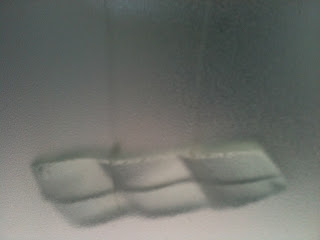An exhibition of installation art, music, drawings and photography. The Translucent Landscapes exhibition will pop-up on March 1-March 22nd at 75 Ghuznee St, and February 26 at the Thistle Hall Lightbox. Opening hours: Every day, 11:00am - 6:00pm
Wednesday, December 7, 2011
Tuesday, December 6, 2011
Space?
Monday, November 28, 2011
Tuesday, November 22, 2011
Doris Lindstrom
Thursday, October 27, 2011
Glass Room
Sunday, October 23, 2011
Tuesday, October 18, 2011
My immediate thoughts on ‘Translucent Landscapes’ when Helen invited me to participate where to reflect on a research trip at the beginning of the year to Lake Grassmere, near Blenheim, in the South Island. We we’re fortunate enough to have a very enthusiastic and interested guide and be there in the midst of the annual salt harvest. The title’ Translucent Landscapes’ suggest the visual, bodily and sound scapes that we experienced on that trip and it certainly resonates with the theme and the video and photographic information gathered will possibly appear in processes.
These have little substance just my current ponderings on the theme, are a discourse on our senses as a landscape, as in ‘an extensive mental view; an interior prospect’ (answers.com). I am waiting from Australia Paul Rodaway book called Sensuous Geographies, Body, Sense and Place, a theoretical survey into the subject. And I am enjoying the possibilities of the play between the Oxford Dictionaries’ definition of translucent as in ‘permitting light to pass through but diffusing it so that persons, or objects on the opposite side are not clearly visible and then ‘clear; transparent as in translucent seawater.’ Play is the best step forward.
Monday, October 17, 2011
Thursday, June 23, 2011
A curatorial position - Hans-Michael Herzog
The so called curator comes with this 'wonderful idea' [from the top] and imposes it on the work. I am interested in an inductive process that works from the art upwards.
Herzog was delightfully scathing about curators - saying the role of the curator had become crazy, with a huge inflation of the role. He also said a person of normal intelligence will leave [most] art related events after 15 minutes because the events are too silly - also damning the whole business of curators indulging in travel related talks, with these becoming the main focus of curator's working lives, rather than the art.
Tuesday, May 31, 2011
Landlords and pop-ups
"As the recession drags on and storefronts across New York remain empty, commercial landlords are turning to an unlikely new class of tenants: artists, who in flusher times tend to get pushed out rather than lured in. And the price of entry is not deep pockets, but vivid imaginations and splashy exhibits — anything to lend the darkened buildings a sense of life.
On terms that are cut-rate and usually temporary — a few weeks or months — the artist gets a gallery or studio, and the landlord gets a vibrant attraction that may deter crime and draw the next wave of paying tenants.
“Any sort of activity is better than no activity,” said Jed Walentas, a Brooklyn developer whose company, Two Trees Management, routinely lends space in Dumbo and Downtown Brooklyn for art projects. “As long as it’s short enough and it’s flexible, then there’s no real cost. So the question is who can you find that’s going to make an investment in a space with that level of uncertainty, and often it’s the artist.”
These “pop-up galleries,” as they are known in Britain, where the phenomenon is well established, are increasingly taking hold in New York as development advocates and landlords struggle to keep up appearances where commerce and construction have stalled.
The demand among landlords is so high that Chashama, a group that has been working for almost 15 years to find vacant real estate for visual and performing artists, no longer has to go looking. Its founder, Anita Durst, said she got calls every day from landlords asking her to find art projects for them. "
The New York Times, Diane Cardwell, Published: October 12, 2009
How to Pop Up
An excerpt from Frieze
"What resources do you need to start up a contemporary art gallery in London? You must have inexhaustible reserves of energy, a large helping of missionary zeal, and a healthy dose of chutzpah. A network of friends willing to help out on a voluntary basis probably helps. Surprisingly, though, you don’t need much money.
These are the consistent responses from a disparate group of young gallerists and emerging dealers currently active in London. All have benefited in one way or another from a decline in property values, which has meant that some spectacular venues have been available that would normally have been redeveloped or occupied by commercial operators.
The minimum budget required to put on a show, according to curator and organiser Katie Guggenheim, is zero—provided you can beg, steal or borrow a space. Guggenheim—a former art student who changed her name by deed-poll as an on-going work of art—has two shows on during Frieze week, both in artist-run spaces she has for free"
From Frieze daily edition, 17 Oct 09




